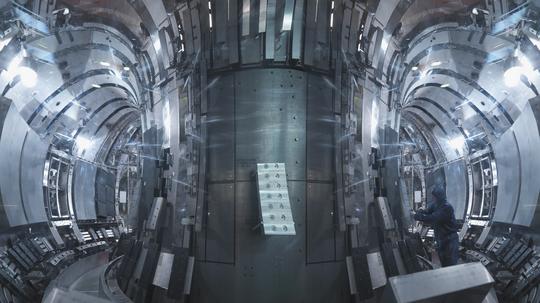
Last week (on September 27), Commonwealth Fusion Systems, a Cambridge-based nuclear-fusion startup, raised over $64 million in equity financing, according to an SEC filing. That very week, Quartz reported that the MIT-launched startup is backed, in part, by Breakthrough Energy Ventures, a fund that's led by billionaires including Bill Gates, Jeff Bezos, Jack Ma, Mukesh Ambani, and Richard Branson.
However, while one promising local nuclear fusion startup was scaling up, another one a mile away, Transatomic Power Corporation (TPC), was just beginning to wind down.
The seven-year-old startup was started by nuclear engineers Dr. Leslie Dewan and Mark Massie while they were still graduate students at MIT. The pair was "incredibly drawn" to molten salts reactor (MSR), which is a nuclear fission reactor where the fuel is a molten salt mixture. "We believe in nuclear energy and were extremely excited about the safety benefits of molten salts reactor," Dewan said.
MSR was first prototyped in the 1960s and met with some success. Meant to be a 'Walkaway Safe' reactor, MSRs are built-in with more safety precautions than water-based reactors and produce a much smaller volume of waste.
And TPC wanted to create an MSR with modern designs and better computer simulations. The company’s idea may have worked in theory, but encountered complications during the build-out stage. Dewan and Massie realized that they'd made a mistake while recreating the design, which steered them away from the original goal of designing a reactor that could use spent fuel rods, managing disposal of waste efficiently. "The updated design still had benefits, but wasn’t as good as we initially thought it would be," Dewan noted.
The company checked off all the boxes on the startup to-do list: raised venture capital in 2014 ($2 million from Founder's Fund), set up partnerships for research with universities and iterated on product design. But TPC was not just-another-consumer-tech-startup and that means it had different kinds of problems. "When we did the redesign, we had a 2x or 3x better product vs 20x better," Dewan said. It was hard for the co-founders to realize that their design was not going to achieve that, which made subsequent fundraising harder. Since the redesign took a long time, the company realized that it wouldn't be able to scale as hard and fast as expected.
But TPC did not want its seven-year-long journey to be for nothing: The redesign may not have created the MSR it wanted but that meant that the value proposition was only changed, not destroyed. "It seemed like we just weren’t going to be able to scale up rapidly enough, so we wanted to be pragmatic about it," said Dewan. "The goal is to have advanced reactors be built. So the best way to move the needle and make that happen is by sharing our work for other startups to use."
And so the company will open-source its patents, making it available for any researchers — private, public or nonprofit to benefit from it. Additionally, it's also in talks with the Department of Energy’s Gateway for Accelerated Innovation in Nuclear (GAIN) to host its research material. TPC is also releasing its patents in the European Union, Russia, and China for its particular version of liquid-fueled reactor designs.
"I am still extremely optimistic for nuclear startups, looking at the rising investments," Dewan noted. Dewan is right, and this couldn't have happened at a more opportune time -- when the world's smartest billionaires are looking to invest $1 billion into energy startups working to reduce emissions and create clean energy.
While nuclear fusion startups are having a moment, concurrently, publicly funded projects like the International Thermonuclear Experimental Reactor (ITER), touted to be the world's largest "largest magnetic confinement plasma physics experiment," is taking the movement forward.
And if Carl Sagan was right about science being a way of thinking, much more than being a body of knowledge, TPC just shared both for the public good.








